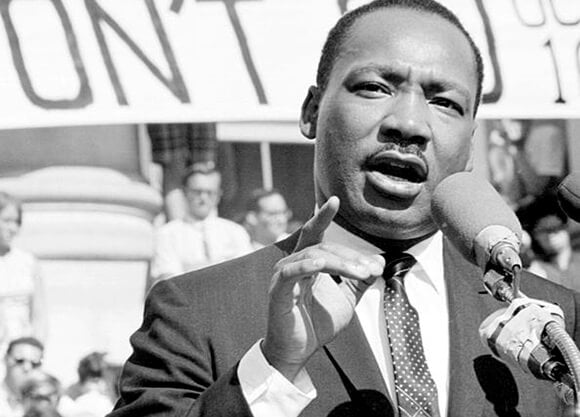
Celebrating Martin Luther King, Jr., and our democratic traditions
January 18, 2021

January 18, 2021

On this Monday in January, we pause to remember a towering figure in our nation’s history, Dr. Martin Luther King Jr. We remember his unwavering commitment to end the oppression of people of color. We remember how he championed change through peaceful means. We remember his sacrifice in dedicating his life to lifting others. And we remember the urgency in his actions to right wrongs. Dr. King serves as inspiration for generations to stand up against inequality, even when sitting down may be the easier path.
We honor Dr. King just two days before our nation partakes in the centuries-old tradition of a peaceful transfer of power, as Joseph R. Biden Jr. is sworn in as the 46th president of the United States. The irony of two recent and related events is not lost on me. In November, we experienced the powerful expression of a democracy when almost 160 million citizens exercised their right to vote in the 2020 election – the largest number of voters in U.S. history. Yet, on the day of certification of that election on Jan. 6, domestic terrorists attacked the U.S. Capitol, threatened our elected officials and members of law enforcement, attempted to silence democracy, and challenged the most fundamental principles of our Constitution.
A peaceful transfer of power has been a hallmark of our democracy since 1801 and has served as an aspirational ideal for nations around the world. Inaugurations are days when we set aside our differences – often after fierce partisan campaigns – and we celebrate together the privileges of freedom of expression, of change through the voice of the people, of raising families in safety and security, of the aspiration of equal rights for all. These are the values that Dr. King espoused and which, ultimately, unforgivably, cost him his life.
While I cannot speak for Dr. King or know what he might say during these turbulent times, I imagine that still, 52 years after his assassination, he would conclude that we are far from a perfect union. There are countless challenges we have yet to overcome as a nation – pervasive injustices against underrepresented groups of all kinds; insidious disparities in economic, health and physical safety; unequal access to education; a worldwide pandemic that has disproportionately attacked those already struggling; and many others. Perhaps Dr. King also would draw on the insurrection at the Capitol to acknowledge a painful truth: Racism still fuels deep divisions and unrest in our country, and we must resolve to express our differences with strong voices, with urgency, but without violence.
A flourishing democracy requires acknowledgement of differences, a commitment to justice, and policies that create equity in opportunity and voice. Deeply entrenched differences may divide us, but a civil society learns to thrive by offering every individual the opportunity to live with dignity, respecting the cultures and roots of those differences, and confronting societal challenges based on reason and facts. That is the promise of a healthy democracy, and it is echoed in the words of Dr. King in his “I Have a Dream” speech in 1963, reminding us:
“This is no time to … take the tranquilizing drug of gradualism. Now is the time to make real the promises of democracy.”
As we witness a key rite of passage in a democracy during Wednesday’s inauguration, I ask each of us in the Quinnipiac community to reflect on our role as an agent of change. What do we do, together, to heal our democracy? How do we become The University of the Future that models globally enlightened citizenry? How do we embody the ideals of a just society, become a “beloved community” that embraces all who enter from their many doors of lived experiences? How do we prepare our students to be champions of justice in their personal and professional lives?
We have already embarked upon this journey, together, through progress on our 10-point Action Plan to Advance Racial Justice, heightened commitments to our LGBTQ+ community, curricula review to engage around difference, launch of an inclusive excellence teaching lab, conversations on challenging topics throughout the year, and outreach to diverse communities and schools to become a more inclusive community. The impact of these actions will be the measure of our progress. I am confident that we will see that progress embodied in the character of our university community built on inclusive excellence, and in the life journeys of our students as courageous champions of positive change.
But progress cannot be delayed. Dr. King, speaking at the Riverside Church in 1967, said:
“We are now faced with the fact that tomorrow is today. We are confronted with the fierce urgency of now. In this unfolding conundrum of life and history, there ‘is’ such a thing as being too late. This is no time for apathy or complacency. This is a time for vigorous and positive action.”
Dr. King dedicated his life to striving for a better society, while inspiring generations. I am an incurable optimist. I am buoyed by the millions who do what is right; who “stand[s] at times of challenge and controversy” for our nation and for global communities; who commit — for ourselves and for future generations — to bettering the world with purpose and respect for our ideals, one day at a time. Let’s join together to achieve “a better society. ‘’ It is the most fitting honor for Dr. King — and the bedrock of our democracy.
My best,
Judy Olian
President
Quinnipiac Today is your source for what's happening throughout #BobcatNation. Sign up for our weekly email newsletter to be among the first to know about news, events and members of our Bobcat family who are making a positive difference in our world.
Sign Up Now